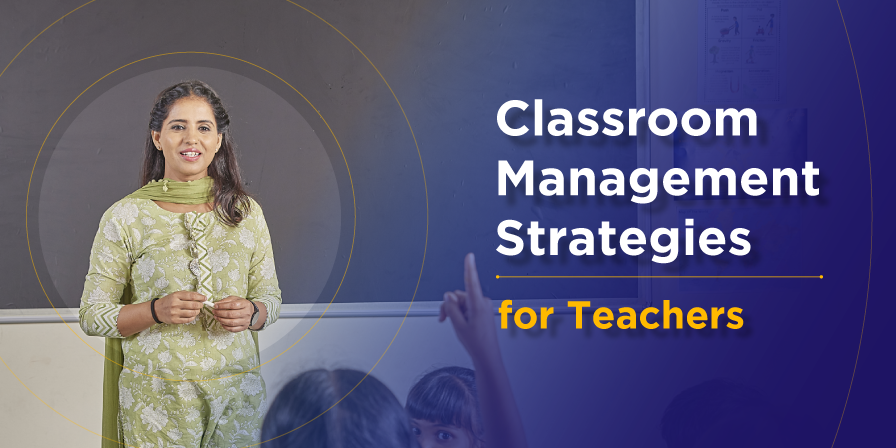What does a LEAD powered classroom look like?
What Are Classroom Management Skills? 25+ Proven Strategies for Effective Teaching

What Are Classroom Management Skills? 25+ Proven Strategies for Effective Teaching
Last Updated On: 17/02/2025
Joel Vas
School Owner
Classroom Management Skills for Teachers: Tips & Best Practices
To effectively apply these skills, you must understand which classroom management strategies resonate best with your students. Below are practical and proven techniques to enhance your classroom management:
Mastering Classroom Management Skills: Best Strategies for Teachers
-
Build an authoritative personality:
An authoritative presence can significantly impact student behaviour. Teachers who project confidence and dignity are more likely to command respect, which is crucial for effective classroom management. Enhance your authority by dressing professionally, speaking confidently, and consistently demonstrating a strong command of your subject matter.
-
Know your subject well:
Authority isn’t just about your demeanor; it’s also about your expertise. Mastery of your subject matter is one of the most powerful classroom management skills. When students recognise that you’re well-prepared and knowledgeable, they’re more likely to respect your authority and stay engaged.
-
Involve students in creating classroom guidelines:
Engaging students in establishing classroom rules is an effective management strategy. This approach fosters a sense of responsibility and ownership among students. At the beginning of the school year, involve students in a discussion about classroom expectations. This collaborative effort builds mutual trust and makes managing behavior throughout the year more straightforward.
-
Empower Student Initiatives:
Encouraging student initiatives is a powerful way to foster engagement and reduce behavioral issues. Allow students to take on responsibilities, such as leading discussions or presenting topics. This not only builds their confidence but also keeps them actively involved in the learning process.
-
Set learning expectations before each lecture:
Start each class by clearly outlining the learning objectives. This practice helps students understand the importance of the lesson and keeps them focused on achieving specific goals. Regularly setting and reviewing these expectations can significantly enhance classroom management.
-
Incorporate Interactive Teaching techniques:
Students have varied learning needs, so it’s important to use diverse teaching techniques. Consider personalised learning, game-based activities, flipped classrooms, or collaborative projects. Interactive teaching methods make lessons more engaging, leading to better classroom management.
-
Integrate Fun and Educational Activities:
Maintaining student interest is key to effective classroom management. Include fun and educational activities like group projects, educational games, or multimedia presentations. A dynamic and enjoyable learning environment reduces distractions and misbehavior.
-
Demonstrate ideal classroom behaviour:
Demonstrating ideal behaviour is one of the most powerful classroom management strategies. Students often mimic their teachers’ actions, so it’s vital to exemplify respect, attentiveness, and proper conduct. By setting a positive example, you encourage students to behave appropriately.
-
Give positive feedback and rewards:
Positive reinforcement is crucial in maintaining a well-managed classroom. Recognize and reward good behaviour and academic achievements. This approach motivates the students who receive praise and encourages others to strive for similar recognition.
-
Be Flexible and Adaptive:
Flexibility is essential in classroom management. Adjust your teaching methods and environment based on your students’ needs and moods. Sometimes, a change in setting or a more relaxed approach can re-engage students and restore order.
-
Address Bad Behaviour Immediately:
Don’t overlook disruptive behaviour. Address it calmly but assertively to prevent escalation. Establish clear consequences for misbehavior and consistently enforce them. This approach helps maintain discipline and sets clear boundaries for acceptable conduct.
Effective Classroom Management Strategies for School Principals
-
Support Teacher Development:
Provide teachers with ongoing professional development opportunities that focus on classroom management techniques and strategies.
-
Establish School-Wide Behavioural Expectations:
Work with teachers and administrators to create a consistent set of behavioral expectations across the school to ensure uniformity in classroom management.
-
Promote Peer Observation:
Encourage teachers to observe each other’s classrooms to share effective management techniques and strategies.
-
Leverage Technology for Monitoring:
Utilize school-wide management software to monitor classroom environments, ensuring consistency and supporting teachers in maintaining order.
-
Engage in Regular Communication with Teachers:
Hold regular meetings with teachers to discuss challenges and successes in classroom management, offering support and resources where needed.
-
Promote Parent Involvement:
Work to create strong communication channels between teachers and parents, reinforcing classroom expectations at home.
How School Administrators Can Enhance Classroom Management
-
Provide Resources for Classroom Management:
Ensure that teachers have access to the resources they need, such as training materials, tools, and support staff, to manage their classrooms effectively.
-
Develop School-Wide Programs:
Create programs and initiatives that support a positive learning environment, such as anti-bullying campaigns, student recognition programs, and wellness initiatives.
-
Monitor School Climate:
Regularly assess the overall school climate to ensure it supports effective classroom management, making adjustments as necessary.
-
Facilitate Collaboration Among Staff:
Encourage collaboration between teachers, counselors, and other staff members to address behavioral issues and share successful management strategies.
-
Use Data to Drive Decisions:
Collect and analyze data on student behavior and classroom management practices to identify areas for improvement and implement targeted interventions.
-
Promote Professional Development:
Invest in ongoing professional development for both teachers and principals, ensuring they are equipped with the latest classroom management techniques.
-
Ensure Consistency in Discipline:
Work with principals and teachers to maintain consistency in disciplinary actions across the school, ensuring fairness and clear expectations.
-
Support Technology Integration:
Facilitate the integration of technology in classrooms that aids in management and engagement, providing necessary training and resources.
What Are Classroom Management Skills? Key Strategies for Educators
Teaching is a powerful profession. With the right approach, you can inspire students and bring about positive changes in their lives. Effective classroom management goes beyond controlling students or maintaining silence; it’s about creating an environment where students feel engaged, motivated, and eager to learn.
Here are some key classroom management skills every teacher should possess:
- Time-management skills: Efficiently manage classroom time to ensure lessons are delivered without rushing.
- Self-discipline: Model the behaviour you expect from students, setting a high standard for them to follow.
- Observation skills: Maintain a keen awareness of student behaviour and classroom dynamics.
- Student engagement: Develop strategies to keep students interested and involved in the lesson.
- Patience and kindness: Address disruptions calmly and with empathy.
- Communication skills: Clearly articulate expectations, instructions, and feedback.
- Subject-matter expertise: Command respect and engage students with deep knowledge of your subject.
- Organization and positivity: Create a structured learning environment with a positive attitude that encourages students to thrive.
Never miss a story
Stay updated with the latest news and articles related to school education
GIVE YOUR SCHOOL THE LEAD ADVANTAGE
How LEAD Enhances Classroom Management Skills in Schools
At LEAD, we recognise that effective classroom management is key to creating an optimal learning environment. That’s why we offer comprehensive teacher training programs designed to equip educators with the essential skills and strategies discussed above. Our training programs help teachers:
- Develop time-management and organizational skills.
- Master communication techniques that foster a positive classroom environment.
- Implement interactive teaching methods that keep students engaged.
- Establish clear guidelines and expectations to prevent disruptive behavior.
LEAD’s innovative solutions include technology-driven tools that support teachers in managing their classrooms effectively. Our digital platforms enable teachers to track student progress, provide timely feedback, and create a structured yet flexible learning environment.
Join over 25,000 teachers in India who are transforming their classrooms with LEAD. Discover how LEAD can help you manage your classroom effectively and improve learning outcomes for your students.
Conclusion
Classroom management is a dynamic and ongoing process that requires patience, consistency, and the right strategies. By consistently applying the skills and techniques outlined above, you can create a positive and productive learning environment that benefits both you and your students.

